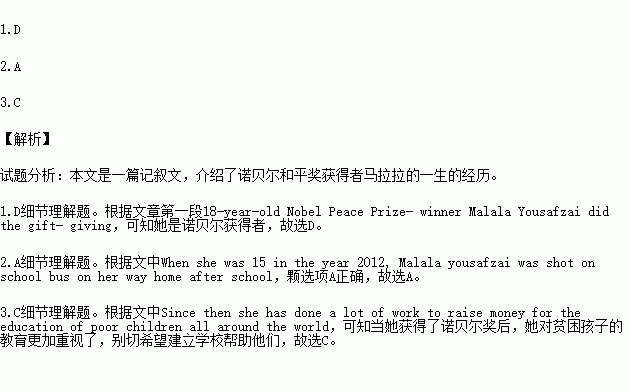题目内容
Celebrating her first day as an adult on July, 12,2015, 18-year-old Nobel Peace Prize- winner Malala Yousafzai did the gift- giving---a girls’ school for Syrian refugees( 叙利亚难民) in Lebanon.
“ I call on leaders of all the countries all around the world that we must invest in books instead of bullets,” Malala Yousafzai said in a speech “ on behalf of the world’s children.” She made it an international conference. When she was 15 in the year 2012, Malala yousafzai was shot on school bus on her way home after school and seriously wounded by some gunmen of the Pakistani Taliban for advocating girls’ education. After recovering ,she continued her advocacy, which led last year to her becoming the youngest Nobel winner ever.
Malala told Reuters that she chose to open the school in Lebanon’s Bekaa Valley “ because I believe that the voices of the Syrian refugees need to be heard, and they have been ignored for so long. We must help them to get education. It is my responsibility to set up some schools for children there.”
schools for children there.”
More than a quarter of the estimated 4 million on Syrians who have fled the country’s civil war are gathering in Lebanon, including about 500,000 school-age children. They have no oppo rtunities to go to school.
rtunities to go to school.
Malala Yousafzai set up Malala Fund shortly after she won the Nobel Peace Prize. Since then she has done a lot of work to raise money for the education of poor children all around the world. The school, near the Syrian border, can hold up to 200 girls aged14 to 18. The school was paid for by Yousafzai’s non-profit Malala Fund. On that day, all the students in the school shared the birthday cake and sang songs, bringing the Nobel winner to tears.
1.What do you know about Malala Yousafzai?
A. She is a middle school student.
B. She is a teacher in Lebanon.
C. She makes gifts for Syrian refugees.
D. She is a Nobel Prize winner.
2.What happened to Malala when she was 15?
A.She was shot by some gunmen.
B. She suffered from a terrible disease.
C. She made a speech in an international conference.
D. She set up her first school for girls.
3.What did Malala choose to do after she won the Nobel Peace Prize?
A. To fight in the civil war in Syria.
B. To protect Syrian refugees.
C. To open some schools for Syrian children
D. To teacher Syrian children in a school.


 angaroo-style stomachs to cattle and sheep in order to cut the greenhouse gases they send out, which are thought to be responsible for global warming.
angaroo-style stomachs to cattle and sheep in order to cut the greenhouse gases they send out, which are thought to be responsible for global warming. of dollars in feed costs for farmers. But it will take researchers at least three years to isolate (分离) the bacteria, before they can even start to develop a way of transferring it to cattle and sheep.
of dollars in feed costs for farmers. But it will take researchers at least three years to isolate (分离) the bacteria, before they can even start to develop a way of transferring it to cattle and sheep.